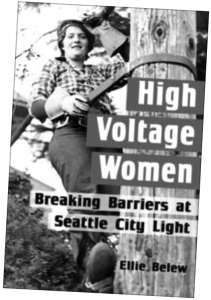 Ellie Belew’s book High Voltage Women: Breaking Barriers at Seattle City Light (Red Letter Press, 2019) is a major feat of researching, organizing and writing what is very complicated information. It is also an inspiring Pacific Northwest story that is an illustration of the song “Freedom is a Constant Struggle.”
Ellie Belew’s book High Voltage Women: Breaking Barriers at Seattle City Light (Red Letter Press, 2019) is a major feat of researching, organizing and writing what is very complicated information. It is also an inspiring Pacific Northwest story that is an illustration of the song “Freedom is a Constant Struggle.”
The book begins with the social background of federal, county and city legislation as it applies to the construction industry and projects. After  Affirmative Action was initiated in the 1970s, Clara Fraser developed the Electrical Trades Trainee program for ten women at Seattle City Light.
Affirmative Action was initiated in the 1970s, Clara Fraser developed the Electrical Trades Trainee program for ten women at Seattle City Light.
The Equal Employment Opportunity Commission, the city of Seattle, Seattle City Light, the ACLU, the National Lawyers Guild, Radical Women and the Freedom Socialist Party are all key players in what became a prolonged series of discrimination cases against Seattle City Light.
The obstacles the women faced were sexual harassment, improper pay, improper termination and layoffs, lack of facilities and red-baiting because of the political views of some of the trainees who belonged to Radical Women and the Freedom Socialist Party.
The women had problems advancing from apprentice to journey positions. As Helen Gilbert described, “common accusations against Clara Fraser were that she was being ‘abrasive,’ ‘defiant,’ and ‘controlling,’ reflecting a deep discomfort at a woman exhibiting strong traits that would have been tolerable in a male.” The management of Seattle City Light led by Superintendent Gordon Vickery often resorted to retaliation when faced with complaints.
This was in a job that is very dangerous and involved climbing light poles and lethal levels of electricity. The book is enhanced by photos of the work and bios and stories of the individual trainees, some of whom had bad accidents. As Kathleen Merrigan says, “Discrimination is a safety issue.”
One admires the tenacity of the women to continue their fight. Belew details the sagas of the parallel legal cases of Clara Fraser and the Electrical Trades Trainees. The book describes their organizing efforts, including the role of the Radical Women and Freedom Socialist Party as well as many other community groups, and shows how other unions helped the trainees even when their own union did not. Eventually, there were rallies and community outreach. Appendices are helpful to get a good idea of all the legal cases.
An interesting point is the more helpful attitude of Black male workers as opposed to the hostility of the White male co-workers. There is also a focus on the experience of the African-American trainees.
Clara Fraser has an individual chapter which spotlights her freedom of speech case. Fraser and the trainees eventually were victorious, regaining their jobs and back pay. Looking at how worker solidarity in general created a bond among women of different backgrounds and goals adds greater understanding as to how their victories were accomplished (one trainee did not participate in the cases).
Belew includes a humorous satiric song, “The Ballad of Clara Fraser” by Patrick Haggerty, as well as a harrowing poem by Joanne Ward, a crew chief, about the dangers of the job, which I found good additions to the material.
The book ends with an update on what the trainees are doing today, how many women are going into the trades and the legacy of the program. It leads one to consider the importance of Affirmative Action which became outlawed in Washington State. While there have not been substantially more women electricians at Seattle City Light, women who are in the trade and other jobs have more often been inspired to raise issues and complaints. An Afterword also looks at the input of the MeToo movement.
I would recommend this book to anyone interested in civil rights or labor law, and any woman going into a male-dominated trade.
Alice Elizabeth Rogoff has received awards for her writing about women labor organizers in San Francisco. She is a contributor to Giving Voice, a LaborFest writers group anthology. In 1970, her suit for sexual discrimination resulted in the company being barred from discriminating against women in a job requiring moving horses at night. She belongs to CWA and CLUW. Her dad worked for a company that made electrical connectors, and another that sold lights.
High Voltage Women is available from Orca Books in Olympia. Order by mail or learn more about the book at http://www.redletterpress.org/highvoltagewomen.html
Be First to Comment